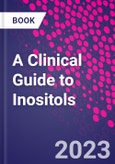A growing body of research demonstrates the potential benefits of the administration of inositol isomers in the treatment of many different disorders, from reproductive to metabolic diseases.
A Clinical Guide to Inositols discusses scientific evidence of inositol-based treatments in different clinical fields to provide clinicians with a practical guide to use inositol supplementation within pathological conditions. Each chapter covers a specific disorder and describes aspects of the application of inositol in clinical practice, discussing the physio-pathologic features of the health condition and scientific evidences of the effects of inositol treatment.This book is a valuable resource to researchers and clinicians looking for a clear understanding of clinical effects of inositol supplementation and a practical guide on inositol-based treatments.
Please Note: This is an On Demand product, delivery may take up to 11 working days after payment has been received.
Table of Contents
1. Introducing inositols and their clinical targets: physiology and pathophysiology2. Effectiveness of Myo- and D-chiro-inositol in the treatment of metabolic disorders
3. Treating PCOS with inositols: choosing the most appropriate myo- to D-chiro-inositol ratio
4. Overcoming inositol-resistance
5. Inositol supplementation for preventing Gestational Diabetes Mellitus
6. Inositol efficacy on the incidence of adverse fetal outcomes
7. Treatments with inositols in the IVF procedures
8. Supplementation with D-chiro-inositol in women
9. Application of myo-inositol and D-chiro-inositol in andrological issues
10. Myo-inositol supplementation for subclinical hypothyroidism
11. Respiratory distress and treatment with Myo-inositol to reduce pulmonary inflammation
12. Inositols as adjuvant treatments in oncology
13. Myo-inositol supplementation restores inositol depletion induced by treatments for psychiatric and neurological conditions








